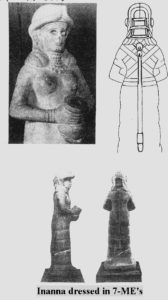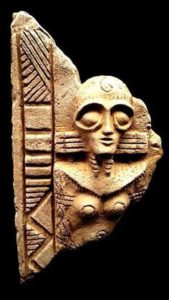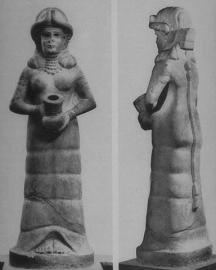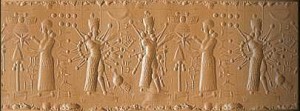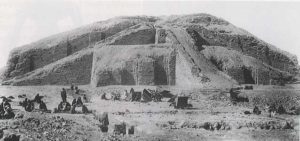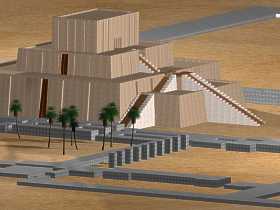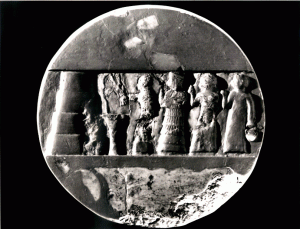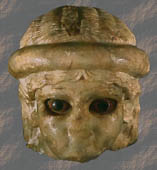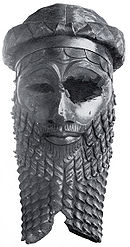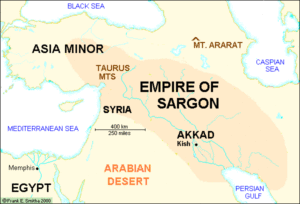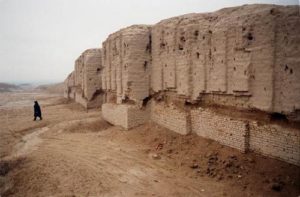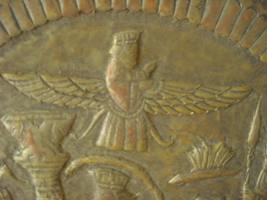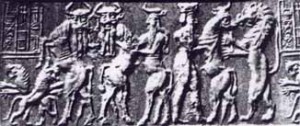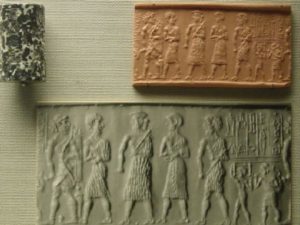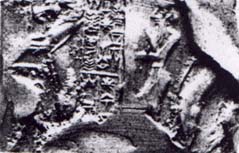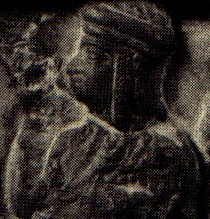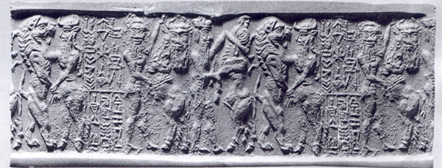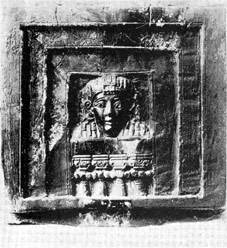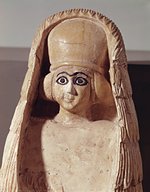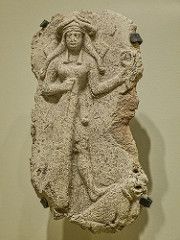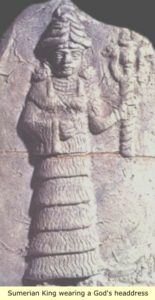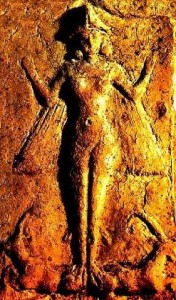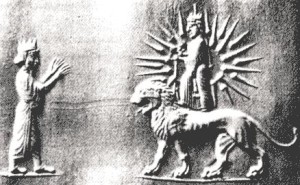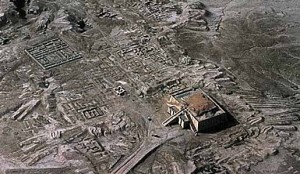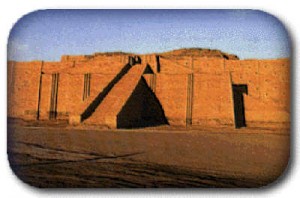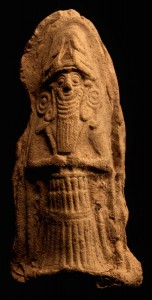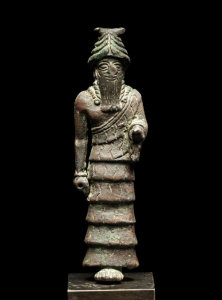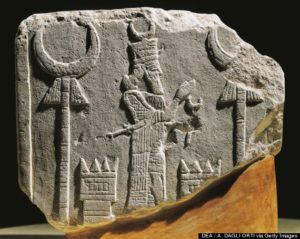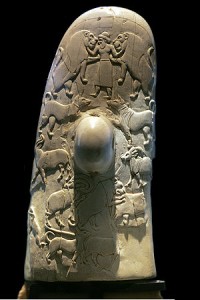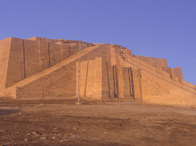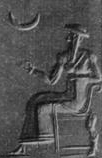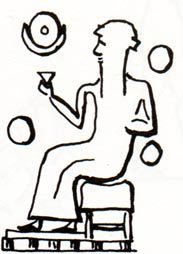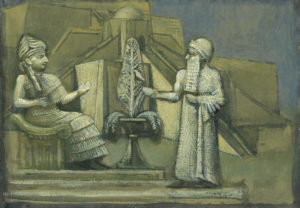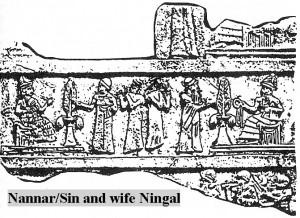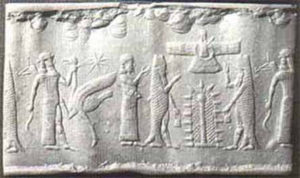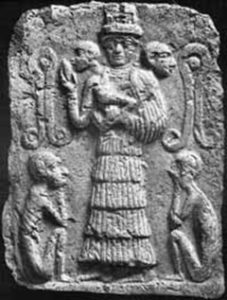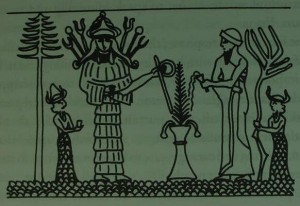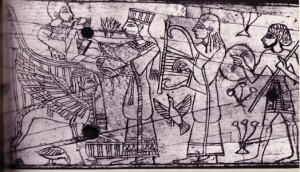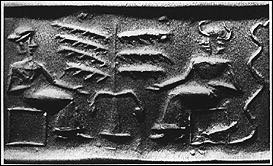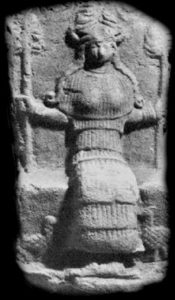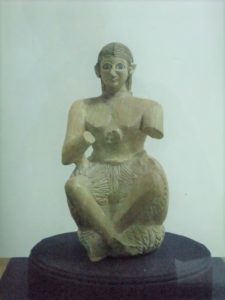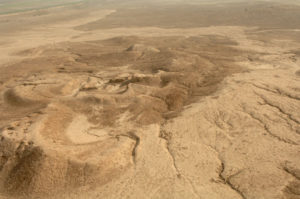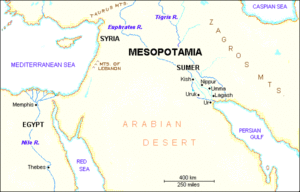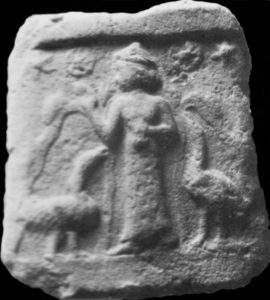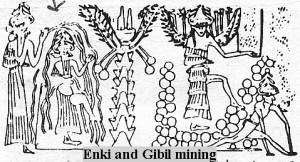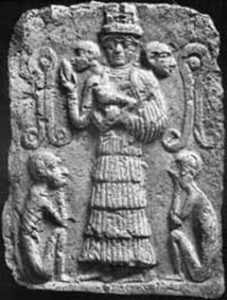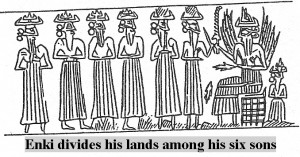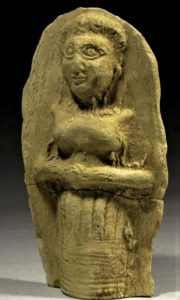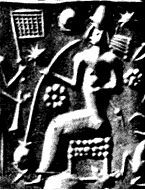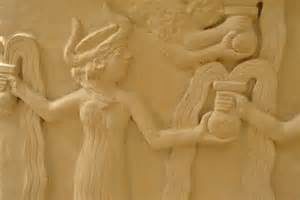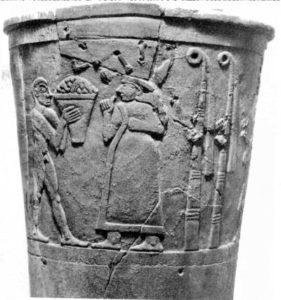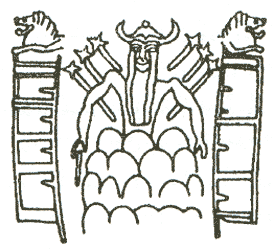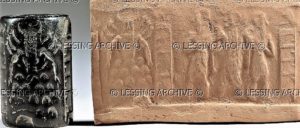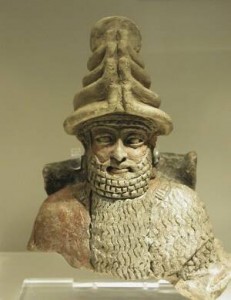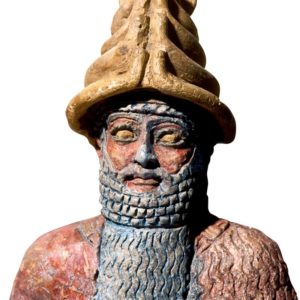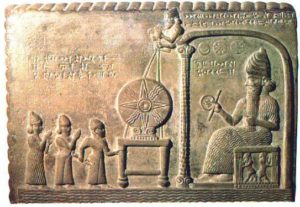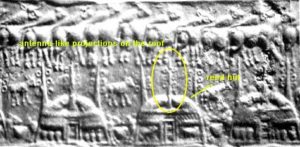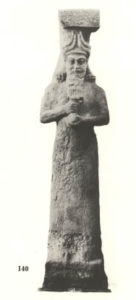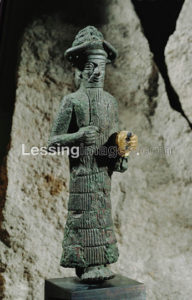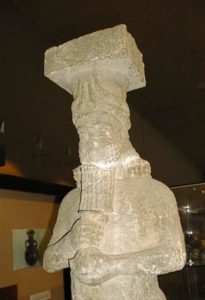SEE SITCHIN’S EARTH CHRONICLES, ETC.:
(Texts: All Artifacts, Color Coding, & Writings in Bold Type With Italics Inside Parenthesis, are Added by Editor R. Brown, not the Authors, Translators, or Publishers!)
(gods in blue …mixed-breed demigods in teal…)
(Enki’s creation = Enkidu, etc., Enlil’s creation = Hawawa)
Anu embraced Inanna as his “Anunitum (Beloved of Anu).”
“Inana, you are the lady of the great divine powers.
Your mother Ningal …… great attributes.
Your father Suen …… great holy cows.
Your brother, the youth Utu…….
Your spouse Ama-ušumgal-ana (Dumuzi), the shepherd, Lord Dumuzid, …….
Your beloved minister(?) Ninšubur …….
Your beloved sister-in-law Ĝeštin-ana (Geshtinanna) …….”
“Holy Inana spoke to her brother the hero, youthful Utu:…
‘My brother, I want to tell you something — pay attention to my speech. ……
Utu, my twin, I want to tell you something — pay attention to my speech.’ …”
Inanna’s boast of her temples / houses throughout Sumer:
“In Unug (Uruk) the E-ana is mine,
in Zabalam the Giguna is mine,
in Nibru (Nippur) the Dur-an-ki is mine,
in Urim (Ur) the E-Dilmuna is mine,
in Ĝirsu the Ešdam-kug is mine,
in Adab the E-šara is mine,
in Kiš (Kish) the Ḫursaĝ-kalama is mine,
in Kisiga the Amaš-kuga is mine,
in Akšak the Anzagar is mine,
in Umma the Ibgal is mine,
in Agade (Akkad) the Ulmaš is mine.
Which god compares with me?
A …… of Inana.”
In the 13th century B.C. a Mesopotamian king stated that he rebuilt Inanna’s temple in her brother Utu’s city of Sippar. The ruins rebuilt upon was at that time eight hundred years old. Her original city with temple was Aratta, located in a far land east of Sumer.
In the Land of Aratta she was “the lofty one, Inanna, queen of all the land”. The great-nephew of Inanna and ruler of Uruk, Enmerkar, set out on a “war of nerves” to force the city of Aratta to submit—
“the lord Enmerkar who is the servant of Inanna
made her queen of the House of Anu …”
She kept her house in Aratta while moving into Anu’s temple in Uruk, becoming a “commuting goddess”.
We read in the ancient text that at first all Enmerkar demanded of Aratta was that it contribute
“precious stones, bronze, lead, slabs of lapis-lazuli
to the building of the enlarged temple,
as well as “artfully fashioned gold and silver”…
“Let Aratta submit to Erech” (Uruk) he demanded …”
She later found the attention of the Anunnaki chief god, Anu and occupied his city, Uruk, and also his temple as his mistress. Texts refer to her as “the holy mistress of Anu”. She then ruled over both cities. She promised,
“From a Golden Chamber in the skies I will watch over thee …”
Inanna, who was born on Earth, “went up to Heaven” at least once… She described her preparation for a trip to see her lover and great-grandfather Anu. She proclaimed,
“You have lifted the Me, you have tied the Me to your hands,
you have gathered the Me, you have attached the Me to your breast…
O Queen of all the Me,
O radiant light Who with her hand grasps the seven Me. …”
Bringing news from Enlil, a messenger:
“brought to me the word of Heaven, his unwashed hands put on me. …”
After other indignities:
“Me, from my temple, they caused to fly;
A Queen am I whom, from my city, like a bird they caused to fly …”
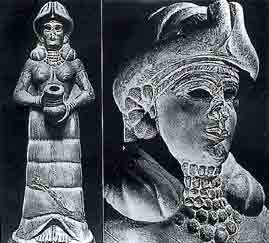
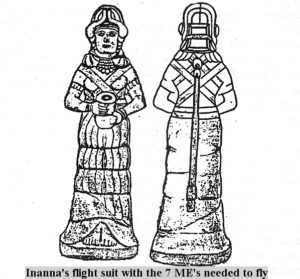
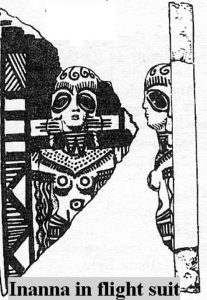
More than one text describes seven objects needed for Inanna’s flights:
-
The SHU.GAR.RA she put on her head.
-
“Measuring pendants,” on her ears.
-
chains of small blue stones, around her neck.
-
Twin “stones” on her shoulders.
-
A golden cylinder, in her hands.
-
Straps, clasping her breast.
-
The PALA garment, clothed around her body.
“SHU.GAR.RA” helmet means “that which makes go far into the universe”
“PALA garment” means “ruler’s garment“
“Measuring pendants” are, seen by the statue of Inanna from Mari, to be headphones “on her ears”
“chains” of small stones “around her neck”
“twin stones“, the two shoulder pads “on her shoulders”
the “golden cylinder” and the “straps, clasping her breast” are clearly visible
Inanna once boasted:
“Enlil himself fastened the divine ME-attire about my body …”
“At the time when Enmerkar in Uruk ruled,
Nungal, the lion-hearted, was the Pilot
who from the skies brought Ishtar (Inanna)
down to the E-Anna. …” (Uruk’s temple – residence)
Just down stream on the Euphrates River was Enki’s city, Eridu. Her search for power brought her to dinner with Enki. There in Enki’s house, she seduces him into giving her 100 divine formulas, held by only Enki. Enki instructed his servant to prepare dinner.
“Come my housemaster Isimud, hear my instructions; a word I shall say to you, heed my words:
The maiden, all alone, has directed her step to the Abzu…
Have the maiden enter the Abzu of Eridu, give her to eat barley cakes with butter,
pour for her cold water that freshens the heart, give her to drink beer. …”
She got Enki good and drunk. Looking her best, she took advantage of Enki in his weakened state, and asked him for the divine formulas. These formulas represented Enki’s power base, for he held the wisdom and thus the keys to “The Tree of Knowledge”. Enlil had the royal rites to the throne, but Enki was the one who was the keeper of the knowledge. (ME’s)
“Lordship…
Godship, the Exalted and Enduring Tiara, the Throne of Kingship…
the Exalted Scepter and Staff, the exalted Shrine, Righteous Rulership…
Bright Inanna took them …”
Enki parted with seven major ME’s, embracing the functions and attributes of a Divine Lady, her temple and rituals, its priests, eunuchs, and prostitutes; warfare and weapons; justice and courts; music and arts; masonry; woodworking and metal working; leatherwork and weaving; scribeship and mathematics…Inanna slipped away and took off in her “Boat of Heaven”.
Enki ordered his chamberlain to pursue Inanna in Enki’s
“Great Heavenly Skychamber …”
And retrieve the ME from Inanna
“Why has Enki changed his word to me? …”
Inanna order her trusted pilot to
“save the Boat of Heaven, and the ME presented to Inanna …”
From An Exaltation of Inanna
“Lady of the ME, Queen
Brightly resplendent;
Righteous, clothed in radiance
Beloved of Heaven and Earth;
Hierodule of Anu,
Wearing the great adorations;
For the exalted tiara appropriate,
For the high-priesthood suitable.
The seven ME she attained,
In her hand she is holding.
Lady of the Great ME,
Of them she is the guardian …”
Hymns acknowledge her new status among the gods and her celestial attributes:
“To the one who comes forth from heaven, to the one who comes forth from heaven,
‘Hail!’ we do say…
Loftiness, greatness, reliability (are hers) as she comes forth radiantly in the evening,
a holy torch that fills the heavens;
Her stance in heaven is like the Moon and Sun…
In Heaven she is secure, the good ‘wild cow’ of Anu
On Earth she is enduring, mistress of the lands.
In the Abzu, from Eridu, she received the ME;
Her godfather Enki presented them to her,
Lordship and Kingship he placed in her hand.
With Anu she takes her seat upon the great throne,
With Enlil she determines the fates in her land …”
Inanna finally married. She chose as her husband, a younger son of Enki, Dumuzi. Texts tell of their marriage, how they quarreled and how they loved. She received marriage blessings from her parents, Nannar / Sin and Ningal, and blessings from her twin brother, Utu / Shamash as well. Some of Dumuzi’s brothers, not Marduk / Ra, blessed the nuptials as well. It’s not clear if Enki responded favorably.
Dumuzi’s brothers hid for her in the bedroom,
“a bed of gold, adorned with lapis lazuli, …”
a precious, blue-hued gem,
“which Gibil had refined for her in the abode of Nergal, …”
At that time this marriage between Enlil and Enki’s families was able to get a pass.
Many songs celebrate the love affair between Inanna…and Dumuzi:
“O that they put his hand in my hand for me.
O that they put his heart next to my heart for me.
Not only is it sweet to sleep hand in hand with him,
Sweetest of sweet is also the loveliness
of joining heart to heart with him …”
It is Inanna (or her earthly representative, the High Priestess of Uruk/the land) again in the Courtship that decrees the fate of the king/Dumuzi. This is a very strong evidence that at least the High Priestess was equal in status to the king, once he had to be first accepted by her to rule the land as her consort. The words that consecrate the king spoken by Inanna are the following:
“In battle, I am your leader
In combat, I am your armor-bearer
In the assembly, I am your advocate
In the campaign, I am your inspiration
You, the chosen shepherd of the holy shrine
You, the king, the faithful provider of Uruk,
You, the light of An’s great shrine
In all ways you are fit
To hold your head high on the lofty dais
To sit on the lapis lazuli throne
To cover your head with the holy crown
To wear long clothes on your body
To bind yourself with the garment of kingship
To race on the road with the holy scepter in your hand
And the holy sandals on you feet
You, the sprinter, the chosen shepherd
In all ways I find you fit
May your heart enjoy long days.
That which An determined for you – may it not be altered
That which Enlil has granted – may it not be altered
You are the favorite of Ningal
Inanna holds you dear …”
She takes Dumuzi by the hand and together they go to Inanna. Ninshubur says:
“My queen, here is the choice of your heart
The king, your beloved bridegroom
May he spend long days in the sweetness of your holy loins.
Give him a favorable and glorious reign!
O my Queen of Heaven and Earth
Queen of all the Universe
May he enjoy long days in the sweetness of your holy loins!
Give him a favorable and glorious reign,
Grant him the king´s throne, firm in its foundations.
Grant him the shepherd´s staff of judgment,
Grant him the enduring crown with the radiant and noble diadem.
From where the sun rises to where the sun sets,
From South to North
From the Upper Sea to the Lower Sea,
From the land of the hulupu tree to the land of the cedar,
Let his shepherd´s staff protect all of Sumer and Akkad …”
Inanna spoke:
“My beloved, the delight of my eyes, met me.
We rejoiced together.
He took his pleasure of me.
He brought me into his house.
He laid me down on the fragrant honey-bed,
My sweet love, laying by my heart,
Tongue-playing, one by one,
My fair Dumuzi did so fifty times. …”
Inanna was in on the plan: Dumuzi, prior to leaving,
“spoke to her of planning and advice …”
and Inanna
“to her spouse answered about the plan,
to him she gave her advice …”
The tragic tale is recorded on a tablet CT.15.28-29. By prearrangement his sister, “the song-knowing sister was sitting there.” She thought she was invited for a picnic. As they were
“eating the pure food, dripping with honey and butter,
as they were drinking the fragrant divine beer,
and were spending the time in a happy mood…
Dumuzi took the solemn decision to do it …”
To prepare his sister for what he had in mind, Dumuzi took a lamb and copulated it with its mother, then had a kid copulate with its sister lamb. Dumuzi was touching his sister in emulation,
“but his sister still did not understand …”
As Dumuzi’s actions became more and more obvious, Geshtinanna
“screamed and screamed in protest …”
but
“he mounted her …
his seed was flowing into her vulva …”
“Halt!” she shouted, “it is a disgrace!” But he did not stop. Having done his deed,
“the Shepherd, being fearless, being shameless, spoke to his sister …”
Dumuzi was soon there-after seized with a premonition that he was to pay for his deed with his life…Waking up, he asked his sister Geshtinanna to tell him the meaning of the dream.
“My brother, your dream is not favorable,
it is very clear to me …”
It foretold
“bandits rising against you from ambush…
your hands will be bound in handcuffs,
your arms will be bound in fetters …”
No sooner had Geshtinanna finished talking than the evil ones appeared…and caught Dumuzi.
The seized Dumuzi manages to escape and reaches the river
“at the great dike in the desert of E.MUSH …”
(Home of the Snakes)…the place where nowadays the great dam of Aswan is located. But the swirling waters did not let Dumuzi reach the other riverbank where his mother and Inanna were standing…
“there did the boat-wrecking waters carry the espoused of Inanna …”
Having disapproved of the Dumuzi–Inanna love match from the beginning, Marduk no doubt was even more opposed to the union after the Pyramid Wars. The rape of Geshtinanna by Dumuzi—was thus an opportunity for Marduk to block the designs Inanna had on Egypt, by seizing and punishing Dumuzi.
As far as she (Inanna) was concerned, Marduk had caused her beloved’s (Dumuzi’s) death. And as the (Akkadian) text makes clear
“What is in holy Inanna’s heart?
To Kill!
To kill the Lord Bilulu (Marduk). …”
Inanna armed herself with an array of weapons to attack the god in his hiding place…she confidently approached The Mountain, which she called E.BIH (Abode of Sorrowful Calling”). Haughtily she proclaimed:
“Mountain, thou art so high, thou art elevated above all others…
Thou touchest the sky with thy tip…
Yet I shall destroy thee,
To the ground I shall fell thee..
Inside thine heart pain I shall cause …”
As Inanna continued to challenge Marduk, now hiding inside the mighty structure (pyramid), her fury rose…
“For the second time, infuriated by his pride,
Inanna approached (the pyramid) again and proclaimed:
‘My grandfather Enlil has permitted me to enter inside The Mountain! …”
Flaunting her weapons, she haughtily announced:
“Into the heart of the Mountain I shall penetrate…
Inside the Mountain, my victory I shall establish! …”
She began to attack:
“She seized not striking the sides of E-Bih and all its corners,
even its multitude of raised stones.
But inside…the Great Serpent who had gone in his poison ceased not to spit …”
The trial was held within sight of the pyramids, in a temple by the riverbank:
“To the place of reverence, by the river,
with him who was accused they stepped.
In truth they made the enemies stand aside.
Justice was performed …”
In sentencing Marduk the mystery of Dumuzi’s death posed a problem…Standing there, in sight of the pyramids, with Marduk fresh out of his hiding place, the solution dawned on Inanna, and she proceeded to address the gods:
“On this day, the Lady herself,
She who speaks truth,
The accuser of Azag (Marduk), the great princess,
An awesome judgment uttered …”
There was a way to sentence Marduk to death without actually executing him, she said:
“Let him be buried alive within the Great Pyramid!
Let him be sealed there as in a gigantic envelope!
In a great envelope that is sealed,
With no one to offer him nourishment;
Alone to suffer,
The potable watersourse to be cut off. …”
The judging gods accepted her suggestion:
“The mistress art thou…
The fate thou decreest: let it be so! …”
Assuming that Anu would go along with the verdict,
“The gods then placed the command to Heaven and Earth. …”
The E.KUR, the Great Pyramid, had become a prison; and one of the epithets of its mistress was, thereafter,
“Mistress of the Prison …”
Marduk had air to breathe; but he had neither food nor water…doomed to die in agony.
Dumuzi’s body was taken to the place of Nergal and Ereshkigal for the funeral.
Descent into the underworld
One of the most famous myths about Ishtar describes her descent to the underworld. In this myth, Ishtar approaches the gates of the underworld and demands that the gatekeeper open them:
“If thou openest not the gate to let me enter,
I will break the door, I will wrench the lock,
I will smash the door-posts,
I will force the doors.
I will bring up the dead to eat the living.
And the dead will outnumber the living …”
The gatekeeper hurried to tell Ereshkigal, the Queen of the Underworld. Ereshkigal told the gatekeeper to let Ishtar enter, but “according to the ancient decree”.
When the news of her arrival was brought to Ereshkigal’s
“her face turned pale…her lips turns dark …”
The gatekeeper lets Ishtar into the underworld, opening one gate at a time. At each gate, Ishtar has to shed one article of clothing. When she finally passes the seventh gate, she is naked. In rage, Ishtar throws herself at Ereshkigal, but Ereshkigal orders her servant Namtar to imprison Ishtar and unleash sixty diseases against her.
When the two came face to face,
“Ereshkigal saw her and burst out at her presence;
Ishtar, unflinching, flew at her …”
…many biblical marital and succession laws were akin…to such laws that governed the behavior of the Anunnaki, the rules regarding a half-sister are but one example… For Ereshkigal was married to Nergal, a brother of Dumuzi: Inanna had come to put the Rule into play…Had Inanna the right to demand that the next in line, Nergal, take her as his second wife…problems that Inanna’s intentions would have caused Ereshkigal can well be imagined.
Inanna was hauled before a hastily convened court of
“seven Anunnaki who judge …”
Found in violation of the rules, and was summarily hung on a stake to die a slow death…Enki, on hearing the terrible news, rushed two emissaries to save her.
“Upon the corpse they directed that which pulsates and that which radiates;…”
they administered to her
“water of life, …”
and
“Inanna arose …”
Ea creates an intersex creature called Asu-shu-namir and sends him-her to Ereshkigal, telling him-her to invoke “the name of the great gods” against her and to ask for the bag containing the waters of life. Ereshkigal is enraged when she hears Asu-shu-namir’s demand, but she has to give him-her the water of life. Asu-shu-namir sprinkles Ishtar with this water, reviving her. Then Ishtar passes back through the seven gates, getting one article of clothing back at each gate, and is fully clothed as she exits the last gate.
Here there is a break in the text of the myth. The text resumes with the following lines:
“If she (Ishtar) will not grant thee her release,
To Tammuz (Dumuzi), the lover of her youth,
Pour out pure waters, pour out fine oil;
With a festival garment deck him that he may play on the flute of lapis lazuli,
That the votaries may cheer his liver. [his spirit]
Belili [sister of Tammuz] (Geshtinanna) had gathered the treasure,
With precious stones filled her bosom.
When Belili heard the lament of her brother, she dropped her treasure,
She scattered the precious stones before her,
‘Oh, my only brother, do not let me perish!
On the day when Tammuz plays for me on the flute of lapis lazuli,
playing it for me with the porphyry ring.
Together with him, play ye for me, ye weepers and lamenting women!
That the dead may rise up and inhale the incense’ …”
the Ishtar myth presumably has a comparable ending, Belili being the Babylonian equivalent of Geshtinanna.
“Upon the corpse, hung from the pole,
They directed the Pulse and the Radiance;
Sixty times the Water of Life,
Sixty times the Food of Life,
They sprinkled upon it;
And Inanna arose. …”
It was only through the interventions of Enki that she was saved and revived…at the same time she went on her trip, Inanna sent her messenger to
“fill heaven with complaints for me
in the assembly (of the gods) cry out for me …”
Inanna, heartbroken and lonely, spent her time on the banks of the Euphrates River, tending a wild-growing tree and voicing her sorrows:
“’When at last shall I have a holy throne, that I may sit on it?
When at last shall I have a holy bed, that I may lie on it?’
Concerning this Inanna spoke…”
“She who let her hair down is ill at heart;
The pure Inanna, Oh how she weeps! …”
Ishtar was above all associated with sexuality: her cult involved sacred prostitution; her holy city Uruk was called the “town of the sacred courtesans”; and she herself was the “courtesan of the gods”.
Even for the gods Ishtar’s love was fatal. In her youth the goddess had loved Tammuz / Dumuzi, god of the harvest, and — if one is to believe Gilgamesh — this love caused the death of Tammuz.
Inanna tried to hustle king Gilgamesh of Uruk after his return from battle and a bath:
“Glorious Ishtar raised an eye at his beauty.
‘Come, Gilgamesh, be thou my lover!
Come, grant me your fruit.
Thou shall be my male mate, I will be thy female.’ …”
The text has been translated in part by Mr. George Smith. Gilgamesh replied,
“Which of thy lovers did thou love forever? …”
“Which of thy shepherds pleased thee for all time? …”
The Epic of Gilgamesh contains an episode involving Ishtar which portrays her as bad-tempered, petulant and spoiled by her father.
She asks the hero Gilgamesh to marry her, but he refuses, citing the fate that has befallen all her many lovers:
“Listen to me while I tell the tale of your lovers.
There was Tammuz (Dumuzi), the lover of your youth, for him you decreed wailing, year after year.
You loved the many-colored roller, but still you struck and broke his wing […]
You have loved the lion tremendous in strength: seven pits you dug for him, and seven.
You have loved the stallion magnificent in battle,
and for him you decreed the whip and spur and a thong […]
You have loved the shepherd of the flock;
he made meal-cake for you day after day, he killed kids for your sake.
You struck and turned him into a wolf;
now his own herd-boys chase him away, his own hounds worry his flanks. …”
Angered by Gilgamesh’s refusal, Ishtar goes up to heaven and complains to the high god Anu. She demands that Anu give her the Bull of Heaven. If he refuses, she warns, she will do exactly what she told the gatekeeper of the underworld she would do if he didn’t let her in:
“If you refuse to give me the Bull of Heaven [then]
I will break in the doors of hell and smash the bolts;
there will be confusion [i.e., mixing] of people,
those above with those from the lower depths.
I shall bring up the dead to eat food like the living;
and the hosts of the dead will outnumber the living. …”
Anu gives Ishtar the Bull of Heaven, and Ishtar sends it to attack Gilgamesh and his friend Enkidu. Gilgamesh and Enkidu kill the Bull and offer its heart to the sun-god Shamash.
While Gilgamesh and Enkidu are resting, Ishtar stands upon the walls of the city (which is Uruk) and curses Gilgamesh. Enkidu tears off the Bull’s right thigh and throws it in Ishtar’s face, saying,
“If I could lay my hands on you,
it is this I should do to you,
and lash your entrails to your side. …”
Then Ishtar called together
“her people, the dancing and singing girls,
the prostitutes of the temple, the courtesans, …”
and had them mourn for the Bull of Heaven.
“Because of my older sister Ereshkigal, …”
she replies,
“Her husband, Gugulanna (Nergal), the Bull of Heaven, has died.
I came to witness the funeral rites …”
“then, my lady, like the nameless poor, you wear only a single garment.
The pearls of a prostitute are placed around your neck,
and you are likely to snatch a man from the tavern.
As you hasten to the embrace of your spouse Dumuzid, Inana,
then the seven paranymphs share the bedchamber with you …”
Inanna…found in Sargon a man to her liking…
“One day my queen,
After crossing heaven, crossing earth—Inanna.
After crossing heaven, crossing earth–
After crossing Elam and Shubur,
After crossing…
The hierodule approached wearily, fell asleep.
I saw her from the edge of my garden;
Kissed her, copulated with her. …”
Inanna…invited Shulgi to Erech, making him “a man chosen for the vulva of Inanna.” …Shulgi’s own words:
“With valiant Utu, a friend as a brother,
I drank strong drink in the temple founded by Anu.
My minstrels sang for me the seven songs of love.
Inanna, the queen, the vulva of heaven and earth,
was by my side, banqueting in the temple …”
Shara, was a son of Inanna & King Shu-Sin.
“To divine Shara, heavenly hero, the beloved son of Inanna:
his father Shu-Sin, the powerful king, king of Ur, king of the four regions,
has built for him the temple Shagipada his beloved shrine; may the king have life. …”
It was the ninth year of Shu-Sin’s reign. It was also his last.
Inanna hurriedly departed from Uruk, sailing off toward Africa in a “submersible ship” and complaining that she had to leave behind her jewelry and other possessions…Inanna / Ishtar bewailed the desolation of her city and her temple by the Evil Wind
“which in an instant, in a blink of an eye
was created against the midst of the mountains, …”
and against which there was no defense…As the
“loyal citizens of Uruk were seized with terror …”
“’Rise up! Hide in the steppe!’
the deities ran off… they took unfamiliar paths …”
“Thus all the gods evacuated Uruk;
They kept away from it;
They hid in the mountains,
They escaped to the distant plains …”
“Mob panic was brought about in Uruk….
its good sense was distorted …”
…as the people asked questions:
“Why did the gods benevolent eye look away?
Who caused such worry and lamentation? …”
When the Evil Storm passed over,
“the people were piled up in heaps…
a hush settled over Uruk like a cloak …”
According to Nabunaid, ruler of Sumer and Akkad in 555 B.C., brought to power by a deal cut between his divine mother and Nannar / Sin to restore Sin’s power over his adversaries in exchange for establishing Nabunaid’s reign.
As Marduk rose to supremacy, Inanna and others became bitterly angry. Nabunaid, the ruler of Sumer and Akkad in 555 B.C., and devoted follower of her father Nannar / Sin, said of her:
“Inanna of Uruk, the exalted princess who dwelt in a gold cella,
who rode upon a chariot to which were harnessed seven lions—
the inhabitants of Uruk changed her cult during the rule of king Erba-Marduk
removed her cella and unharnessed her team …”
She
“had therefore left the E-Anna angrily,
and stayed hence in an unseemly place …”
Nabunaid, as promised by his mother to Sin, also restored the temples of Utu and Inanna, Sin’s twin children. Nabunaid stated:
“I sought out its ancient foundation-platform,
and I went down eighteen cubits into the soil.
Utu, the Great Lord of Ebabbara…
Showed me personally the foundation-platform
of Naram-Sin, son of Sargon, which for 3,200 years
no king preceding me had seen …” “
Inanna…had gone on to capture Jericho–the city dedicated to Sin, Inanna’s father, switched alliance to another… god…The surrender of this “city of date-palms” to armed Inanna is depicted
The Curse of Agade chronicled…that Inanna had indeed gotten out of hand, “the word of the Ekur” (Enlil’s sacred precinct) was issued against her. But Inanna…forsook her temple and escaped from Agade:
“The ‘word of Ekur’ was upon Agade like a deadly silence;
Agade was all atremble, its Ulmash temple was in terror; …”
“She who lived there, left the city.
The maiden forsook her chamber;
Holy Inanna forsook her shrine in Agade …”
The great gods arrived in Agade, they only found an empty temple; all they could do is strip the place of its attributes:
“In days not five, in day not ten,
The crownband of lordship, the tiara of Kingship,
the throne given to rulership Ninurta brought over to his temple;
Utu carried off the city’s ‘Eloquence’;
Enki withdrew its ‘Wisdom.’
Its Awesomeness that could reach the Heaven,
Anu brought up to the midst of Heaven.”
“The kingship of Agade was prostrated, its future was extremely unhappy …”
Then
“Naram-Sin had a vision,
He kept it to himself, put it not in speech,
spoke with nobody about it…
Seven years Naram-Sin remained in wait …”
A text whose ancient title was “Queen of All the ME” acknowledges that Inanna had indeed, deliberately, decided to defy the authority of Anu and Enlil…and declared herself the Supreme Deity, a “Great Queen of Queens.” Announcing that she
“has become greater than the mother who gave birth to her…
even greater than Anu …”
…in Erech, aiming to dismantle this symbol of Anu’s authority:
“The heavenly kingship was seized by a female…
She changed altogether the rules of Holy Anu,
Feared not the great Anu.
She seized the E.Anna from Anu—
that House of irresistible charm, enduring allure–
On that House she brought destruction;
Inanna assaults its people, makes them captive …”
The coup…against Anu was accompanied by a parallel attack on Enlil’s seat and symbols of authority. This task was assigned by Inanna to Naram-Sin. Upon receiving his new orders:
“He defiled the word of Enlil,
Crushed those who had served Enlil,
Mobilized his troops, and
Like a hero accustomed to high-handedness
Put a restraining hand on the Ekur.
Like a bandit he plundered it …”
“Erecting large ladders against the House, …”
smashing his way in, he entered its Holy of Holies:
“the people now saw its sacred cella, a chamber that knew not light;
the Akkadians saw the holy vessels of the god …”
Naram-Sin
“cast them into the fire,
docked large boats at the quay by the House of Enlil,
and carried off the possessions of the city …”
The horrible sacrilege was complete…Enlil “lifted his eyes”… ”Because his beloved Ekur had been attacked,” he ordered the hordes of Gutium—a mountainland to the northeast of Mesopotamia—to attack Akkad and lay it waste. They came down upon Akkad and its cities
“in vast numbers, like locusts…nothing escaped their arm …”
The fall of Akkad was due to Naram-Suen’s attack upon the city of Nippur. When prompted by a pair of inauspicious oracles from Inanna, the king sacked the E-kur temple, the House of Enlil. As a result of this, eight chief deities of the Anunnaki pantheon came together and withdrew their support from Akkad.
“For the first time since cities were built and founded,
The great agricultural tracts produced no grain,
The inundated tracts produced no fish,
The irrigated orchards produced neither wine nor syrup,
The gathered clouds did not rain, the masgurum did not grow.
At that time, one shekel’s worth of oil was only one-half quart,
One shekel’s worth of grain was only one-half quart. . . .
These sold at such prices in the markets of all the cities!
He who slept on the roof, died on the roof,
He who slept in the house, had no burial,
People were flailing at themselves from hunger …”
“the city who dared assault the Ekur …”
“And lo, so it came to pass…
Agade is destroyed. …”
Agade forever remained desolate…her father Nanner came forth to fetch her back to Sumer while
“her mother Ningal proffered prayers for her,
greeted her back at the temple’s doorstep …”
“Enough, more than enough innovations,
O great Queen! …”
“and the foremost Queen, in her assembly, accepted the prayer …”
The Era of Ishtar was over.
From the Sumerian (“Black-Headed People”), the hymns went:
“In all the land, the black-headed people assemble
when abundance has been placed in the store-houses of Sumer …”
“They come to her with…they bring disputes before her.
She renders judgment to the evil and destroys the wicked;
She favors the just, determines good fate for them…
The good lady, the joy of Anu, a heroine she is;
She surely comes forth from Heaven…
She is mighty, she is trustworthy, she is great;
She is exceeding in youthfulness …”
Inanna instituted the custom of “Sacred Marriage”, sexual rites whereby the priest-king was supposed to have become her spouse—but only for one night. A text, attributed to King Iddin-Dagan:
“The male prostitutes comb her hair…
They décor the neck with colored bands…
Their right side they adorn with woman’s clothing as they walk before the pure Inanna…
Their left side they cover with mens clothing as they walk before the pure Inanna.
With jump ropes and colored cords they compete before her…
The young men, carrying hoops, sing before her…
The maidens, Shugia priestesses, walk before Inanna…
They set up a bed for my lady,
They cleanse rushes with sweet smelling cedar oil;
For Inanna, for the King, they arrange the bed…
The king approaches her pure lap proudly;
Proudly he approaches the lap of Inanna…
He caresses her pure lap,
She stretches out on the bed, the pure lap;
She makes love with him on her pure bed.
She says to Iddin-Dagon: ‘Surely, you are my beloved. …”
The hymn Inanna and Ebih tells the story of how Inanna devastated the land that would not worship Her:
From “Ninmesara”, Enheduanna´s masterwork,
“That you totally destroy rebellious lands – be it known!
That you roar at the land – be it known!
That you kill – be it known!
That like a dog you eat the corpses – be it known!
That your glance is terrible – be it known!
That you lift this terrible glance – be it known!
That your glance flashes – be it known!
At those who do not obey – be it known!
That you attain victories – be it known! …”
“To pester, insult, deride, desecrate – and to venerate – is your domain, Inanna.
Downheartedness, calamity, heartache – and joy and good cheer –
is your domain, Inanna.
Tremble, afright, terror – and dazzling and glory – is your domain, Inanna …”
From Let Me Teach You the Lies of Women:
“While I, the lady, was passing the day yesterday,
while I, Inanna, was passing the day yesterday,
while I was passing the day, while I was dancing,
while I was singing songs all day until evening, he met me, he met me.
The lord, the friend of An (Anu), met me; the lord took me in his hands,
Ucumgal-ana embraced me about my neck …”
“……, let me go, so that I can go to our house!
Friend of Enlil, let me go, so that I can go to our house!
What lie can I offer to my mother?
What lie can I offer to my mother Ningal? …”
“Let me teach you, let me teach you!
Inanna, let me teach you the lies of women’:
“My girlfriend was dancing with me in the square.
She ran around playfully with me, banging the drum.
She sang her sweet songs for me.
I passed the day there with her in pleasure and delight …”
“Offer this as a lie to your own mother.
As for us — let me make love with you by moonlight!
Let me loosen your combs on the holy and luxuriant couch.
May you pass a sweet day there with me in voluptuous pleasure. …”
From A Tigi to Inanna and Dumuzid
a text in which Inanna describes passionate lovemaking with her own brother…Utu:
“My beloved met me, took his pleasure of me, rejoiced together with me.
The brother brought me to his house, made me lie on its sweet bed…
In unison, the tongue-making in unison, my brother of fairest face
made fifty times. …”
Canaanite Quotes of Anat From Zecharia Sitchin Book
Anat visits her brother Ba’al. Ba’al dismisses his wives and proceeds to have sex with his sister Anat.
“They look into each others’ eyes, they anoint each others’ ‘horns’ …”
“He seizes and holds her womb. …”
“She seizes and holds his ‘stones.’ …”
“The maiden Anat…is made to conceive and bear …”
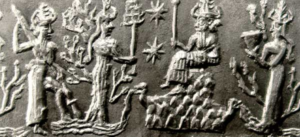 (King Anu well received arriving on Earth Colony)
(King Anu well received arriving on Earth Colony)
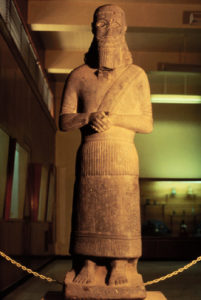
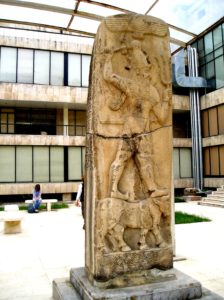 (Ishkur / Adad, Inanna‘s uncle)
(Ishkur / Adad, Inanna‘s uncle)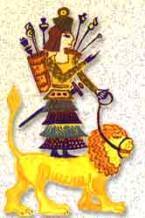
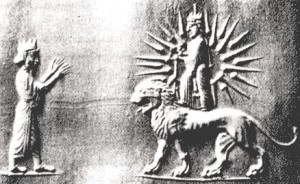 (King Anu & great-granddaughter Inanna)
(King Anu & great-granddaughter Inanna)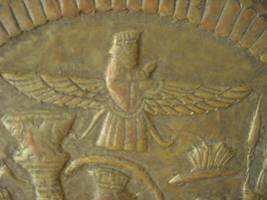 (alien Anunnaki King Anu in his winged sky-disc)
(alien Anunnaki King Anu in his winged sky-disc)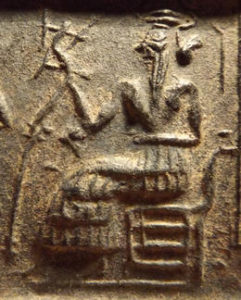
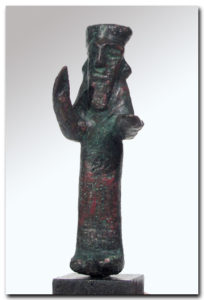 (Enlil, King Anu‘s son & heir, Inanna‘s grandfather & Earth Colony Commander)
(Enlil, King Anu‘s son & heir, Inanna‘s grandfather & Earth Colony Commander)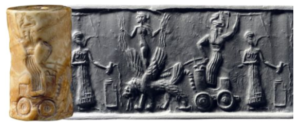 (Inanna goddess of sex & battles between loyal & disloyal earthlings)
(Inanna goddess of sex & battles between loyal & disloyal earthlings)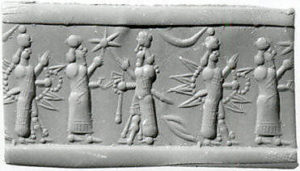 (Inanna, Enlil, & Adad, with symbols of gods above)
(Inanna, Enlil, & Adad, with symbols of gods above)
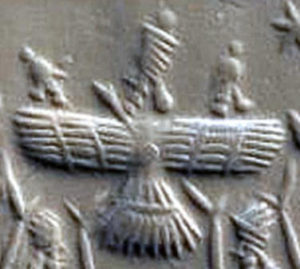 (Ninurta‘s storm bird sky-disc; Enlil, Anu, & Enki in another sky-disc)
(Ninurta‘s storm bird sky-disc; Enlil, Anu, & Enki in another sky-disc)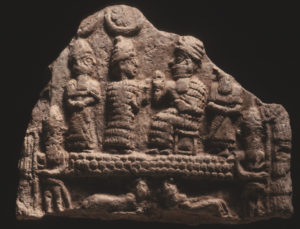 (giant alien gods Utu & Inanna before father Nannar / Suen)
(giant alien gods Utu & Inanna before father Nannar / Suen)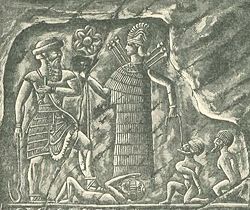 (giant gods Utu & twin sister Inanna hold much smaller earthlings captive)
(giant gods Utu & twin sister Inanna hold much smaller earthlings captive)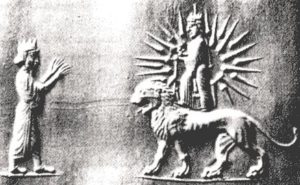 (King Anu & great granddaughter Inanna)
(King Anu & great granddaughter Inanna) 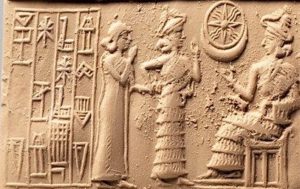 (Inanna presents her semi-divine spouse-queen to mother Ningal)
(Inanna presents her semi-divine spouse-queen to mother Ningal)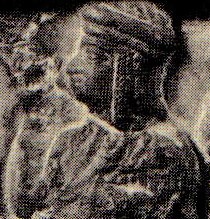 (Enheduana, mixed-breed high-priestess of Nannar, Sargon‘s daughter, & possibly Inanna‘s)
(Enheduana, mixed-breed high-priestess of Nannar, Sargon‘s daughter, & possibly Inanna‘s)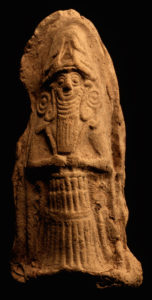
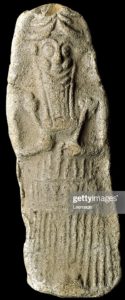 (Anunnaki King Anu, father in heaven / planet Nibiru, to those running Earth Colony)
(Anunnaki King Anu, father in heaven / planet Nibiru, to those running Earth Colony)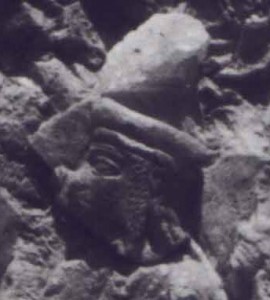 (Enheduana, perhaps Earth’s 1st author other than gods, scribe taught by Nisaba)
(Enheduana, perhaps Earth’s 1st author other than gods, scribe taught by Nisaba)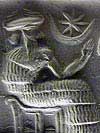 (Nannar, Inanna‘s father, patron Moon Crescent god of Ur)
(Nannar, Inanna‘s father, patron Moon Crescent god of Ur)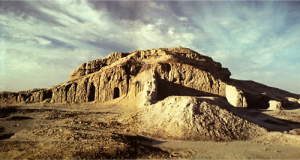 (E-ana, Anu‘s & Inanna’s temple residence in Uruk)
(E-ana, Anu‘s & Inanna’s temple residence in Uruk)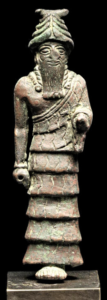 (Nannar, Enlil‘s 2nd son, lord over Ur, home of Biblical Abraham)
(Nannar, Enlil‘s 2nd son, lord over Ur, home of Biblical Abraham)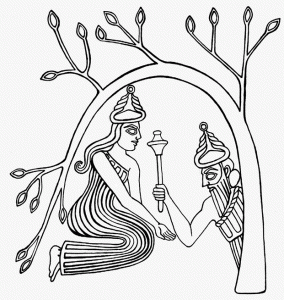 (Inanna & her spouse Dumuzi, who died young leaving young Inanna widowed)
(Inanna & her spouse Dumuzi, who died young leaving young Inanna widowed)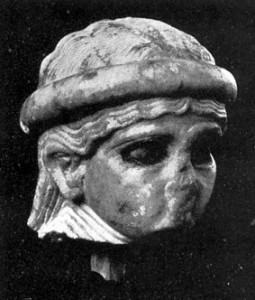
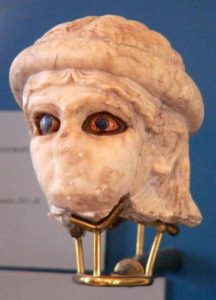 (Ningal, Nannar‘s spouse, Inanna‘s mother)
(Ningal, Nannar‘s spouse, Inanna‘s mother)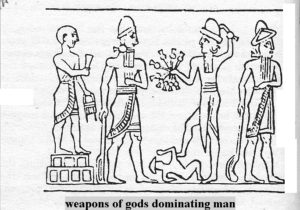 (semi-divine high-priest upon Nannar‘s ziggurat residence in Ur, Nannar, Utu, & Ninurta)
(semi-divine high-priest upon Nannar‘s ziggurat residence in Ur, Nannar, Utu, & Ninurta)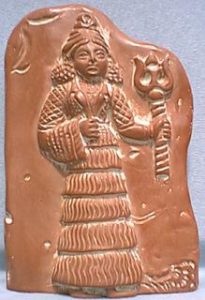 (Inanna, powerful descendant of alien Anunnaki King Anu)
(Inanna, powerful descendant of alien Anunnaki King Anu)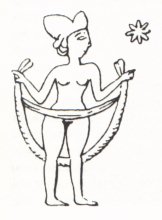
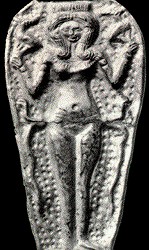 (Inanna, irresistible Goddess of Love)
(Inanna, irresistible Goddess of Love)